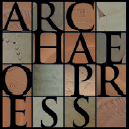
Publishing Scholarly Archaeology since 1997

Download Sample PDF
H 290 x W 205 mm
478 pages
213 Figures
Published Jul 2023
ISBN
Paperback: 9781784914561
Digital: 9781784914578
Keywords
Anthropology; Archaeological Theory; Ethnography; Ethnoarchaeology; Ethnohistory; Linguisticst; Literature
Related titles





Mirrors of Salt: Proceedings of the First International Congress on the Anthropology of Salt
20-24 August 2015, ‘Al. I. Cuza’ University, Iași, Romania
Edited by Marius Alexianu, Roxana-Gabriela Curcă, Olivier Weller, Ashley A. Dumas
The study of salt from an anthropological perspective provides a holistic view of its role in the evolution of human communities. Studies from around the world, ranging from prehistory to modern times, are here organized into 6 sections: theory, archaeology, history, ethnography/ ethnoarchaeology/ethnohistory, linguistics, and literature.
Contents
About the Author
Marius Alexianu is Senior researcher at Alexandru Ioan Cuza University of Iasi, Romania. His research interests encompass ethnoarchaeology and the anthropology of salt. He has published the first study on the concept of the anthropology of salt and is the author of the book chapter Ethnoarchaeology of Salt in Romania, published in the Encyclopedia of Global Archaeology, edited by Claire Smith (2nd ed. 2020).Roxana-Gabriela Curcă is Associate Professor at Alexandru Ioan Cuza University of Iasi, Romania. She specializes in ancient history, Classical philology and the ethnography of salt. She has published on the correlation between ancient Greek/Latin texts and current practices in Moldova in the field of halotherapy.
Olivier Weller is a researcher at the CNRS (UMR 8215 Trajectoires, CNRS-Université Panthéon-Sorbonne, Paris, France). His research concerns the archaeology of salt and the origins of its production in Europe, from the Neolithic period onwards, through exploitation techniques, uses and socio-economic issues. The approaches developed are technological (ceramics), ethnoarchaeological, paleoenvironmental, physicochemical and geomatic. His studies have been developed from Europe (France, Spain, Germany, Poland, Romania, Moldavia, Bulgaria) to Oceania (New Guinea, Tonga). He is currently director of the Trajectories laboratory (2019-2024).
Ashley A. Dumas is Associate Professor of Anthropology at the University of West Alabama. She is a specialist in the late precolonial period of the Southeastern USA. She is the editor, with Paul N. Eubanks of Salt in Eastern North America and the Caribbean: History and Archaeology (2021).

 Add to wishlist
Add to wishlist
